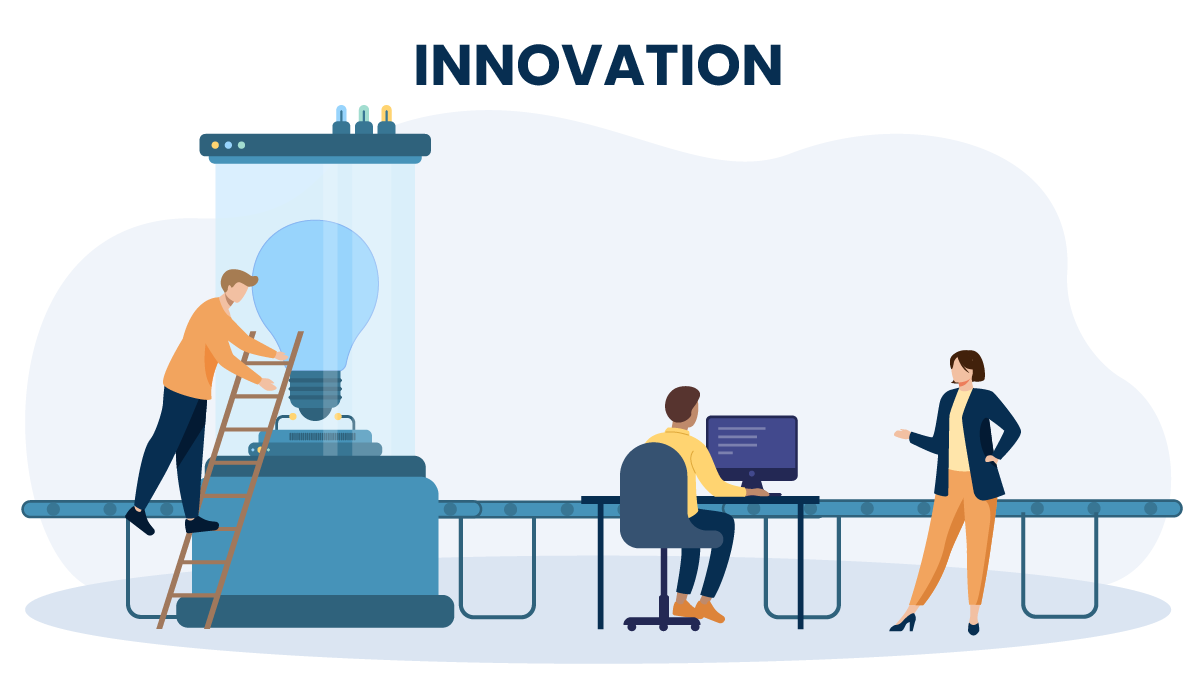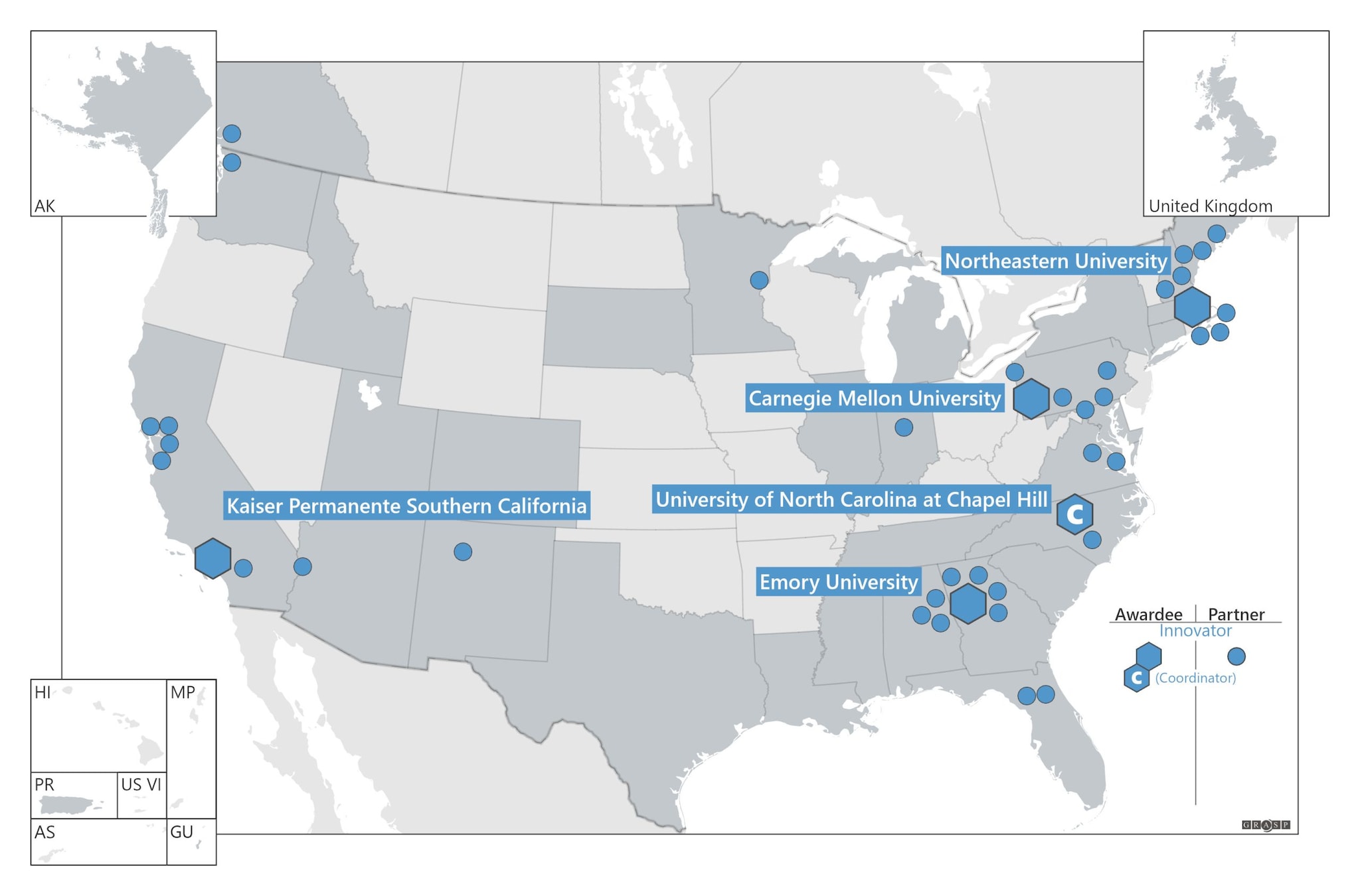Highlights
- Insight Net partners called Innovators are responsible for developing advanced methods and tools to boost analysis of infectious disease spread data.
- Innovators will train specialists with the skills needed to use new modeling tools for more precise public health decision-making.

How Is disease modeling revolutionizing public health?
CDC's Center for Forecasting and Outbreak Analytics (CFA) established Insight Net to help modernize modeling of infectious disease spread to give public health decision-makers relevant information quickly during outbreaks. Insight Net's team partners called Innovators develop the advanced analytic methods and tools that help Insight Net achieve this goal.
This includes:
- Tapping new data sources or finding ways to use existing data in new ways.
- Training and developing a diverse infectious disease modeling workforce.
CFA funded the following partners to be Innovators:
- Kaiser Permanente Southern California (KPSC)
- Emory University, University of North Carolina – Chapel Hill
- Carnegie Mellon University
- Northeastern University

Spotlight
Kaiser Permanente Southern California (KPSC) Department of Research and Evaluation is teaming up with the University of California, Berkeley and University of California, San Francisco to improve the capture of healthcare data needed for infectious disease modeling and public health responses.
Surveillance data drives outbreak forecasting, but those data can be limited and take time to gather, which can slow modeling down and make it less precise. This partnership leverages KPSC's healthcare data systems, with more than 4.7 million members, to capture loads of case data in real time. Faster, more plentiful data support more precise and timely outbreak modeling and forecasts.
The partnership envisions its data capture successes to spread to healthcare systems across the country, increasing the flow of outbreak data into public health data infrastructures and academic research. This could also lead to more coordination between healthcare systems and public health in responses to infectious disease outbreaks.
Who are Insight Net's Innovators?
Carnegie Mellon University is innovating new analytical methods and tools, including nowcasting and disease outbreak forecasting to provide information to state and local public health decision makers. Their Delphi research group is furthering the theory and practice of epidemic tracking and forecasting, with a long-term vision of making disease modeling as universally accepted and useful as weather forecasting is today. Delphi's work incorporates collection and sharing unique data streams and indicators that reflect epidemic or pandemic activity then using these data for nowcasting (situational awareness) and short-term forecasting. Their partners include the University of California, Berkley, University of British Columbia, Optum, and Allegheny County Health Department.
Emory University and their collaborators formed the Center for Infectious Disease Modeling & Analytics and Training Hub (CIDMATH) to harness innovative analytic methods and data streams. The team is designing, implementing, and refining analytical methods and tools to support public health decision-making. CIDMATH also hosts the annual Summer Institute in Statistics and Modeling in Infectious Diseases (SISMID) to provide training to the infectious disease epidemiology and modeling community. Emory's partners include Kaiser Permanente of Georgia, Grady Healthcare, Georgia Emerging Infection Program, and Georgia Department of Public Health.
KPSC is building on prior successes that used KPSC's integrated healthcare delivery model. With more than 4.7 million members, the KPSC system is ideal for testing the rapid expansion of data collection to inform outbreak modeling, enabling healthcare organizations to be more directly integrated into public health and academic research. Their partners include the University of California, Berkeley, the University of California, San Francisco, and state and local health departments in California.
Northeastern and their collaborators formed Epistorm, the Center for Advanced Epidemic Analytics and Predictive Modeling Technology, to use new breakthroughs in machine learning, data access, and computational capacity to create a new generation of modeling methods, platforms, and analytic tools. These new products will include comprehensive data integration from diverse sources like wastewater, genomic sequencing, and mobility tracking. Partners include Boston University, Fred Hutchinson, Gingko Bioworks, Indiana University, Los Alamos National Laboratory, Maine Health, Maine Department of Health and Human Services, New Hampshire Department of Health and Human Services, Massachusetts Department of Public Health, Boston Public Health Commission, Northern Light Health, University of California, San Diego, and University of Florida.
The University of North Carolina at Chapel Hill and its collaborators formed the Atlantic Coast Center for Infectious Disease Dynamics and Analytics (ACCIDDA) to develop innovative modeling and analytic techniques, with an emphasis on approaches for novel routes of transmission. Partners include Johns Hopkins University, University of Florida, University of Pittsburgh, North Carolina Department of Health and Human Services, Maryland Department of Health, California Department of Public Health, Baltimore City Health Department, and the Navajo Epidemiology Center.
The ACCIDDA team also serves as the coordinator for the entire Insight Net, working closely with CFA to coordinate the efforts of the broader outbreak analytics and disease modeling network. In addition, ACCIDDA works with CFA and awardees to support the development and implementation of new modeling and forecasting activities across the U.S.
